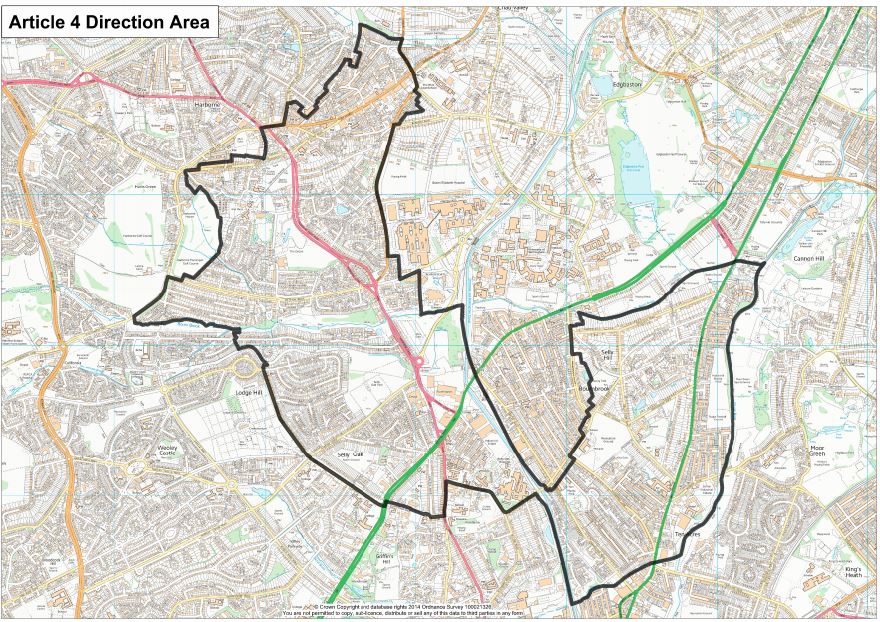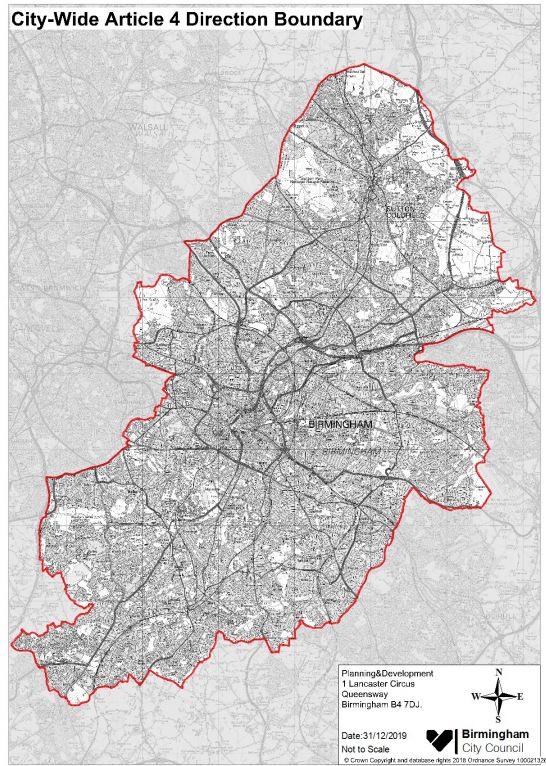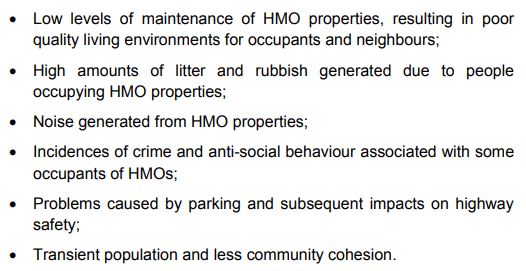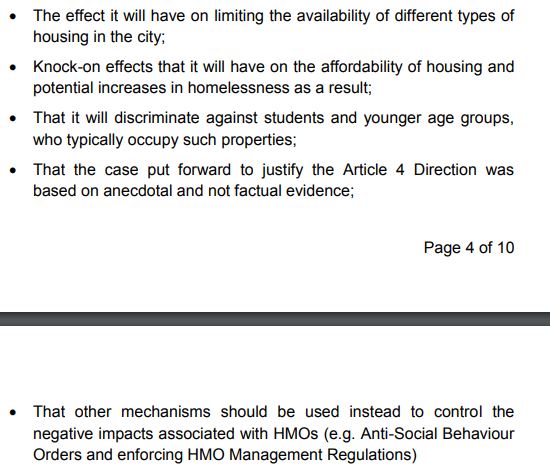Birmingham City Council – Article 4

Executive Summary
- As of 8th June 2020, across the whole of Birmingham, property owners can no longer change a family home into an HMO (3-6 unrelated occupants) without first obtaining planning permission.
- Planning permission for this change of use is very restricted.
- If you already have a property in C4 use class, Birmingham City Council are asking that you register it here; or use this form.
- If you don’t maintain the C4 usage of a property (and retain supporting evidence), you lose the classification and would have to apply to change it back (which is not guaranteed), and could wipe thousands of pounds off the value of your property.
We can make your application for a certificate of lawful use for you.
What is the Article 4 Direction
An Article 4 Direction is a mechanism used by local government to enact a change to permitted development rights.
This Direction restricts the existing permitted development right to change the usage of a property from C3 to C4.
Use classes are used by local authorities to dictate what a particular property can be used for. Councils may for example wish to restrict the number of takeaway food restaurants on one street.
Use class C3 is defined as:
- C3(a) covers use by a single person or a family (a couple whether married or not, a person related to one another with members of the family of one of the couple to be treated as members of the family of the other), an employer and certain domestic employees (such as an au pair, nanny, nurse, governess, servant, chauffeur, gardener, secretary and personal assistant), a carer and the person receiving the care and a foster parent and foster child
- C3(b) covers up to six people living together as a single household and receiving care e.g. supported housing schemes such as those for people with learning disabilities or mental health problems
- C3(c) allows for groups of people (up to six) living together as a single household. This allows for those groupings that do not fall within the C4 HMO definition, but which fell within the previous C3 use class, to be provided for i.e. a small religious community may fall into this section as could a homeowner who is living with a lodger
We describe C3 properties in short-hand as ‘family homes’.
Use class C4 is defined as:
- Small shared houses occupied by between three and six unrelated individuals, as their only or main residence, who share basic amenities such as a kitchen or bathroom.
We tend to describe these properties as a standard HMO.
Although not affected by this change in regulations, it’s important to note that HMO properties let to seven or more unrelated individuals fall into the Suis Generis class, which means ‘without class’ or ‘in a class of it’s own’. Changes to seven or more bedrooms in an HMO have always required a change in planning permission.
From 8th June 2020, the existing Article 4 restrictions which covered this area are being replaced by a city wide direction.
From 8th June 2020 property owners will not be able to change the use of their property from C3 to C4 without obtaining planning permission. The criteria for planning permission to be granted for this change of use was initially publicised as:
- Not creating more than 10% density of C4 properties within a 100m radius.
- Not creating a situation where an existing dwelling was sandwiched by an adjoining HMO on both sides.
- Exceptional circumstances: In a situation “Where the concentration of HMOs in an area may be at such a point where the introduction of any new HMO would not change the character of the area”, an application may be accepted.
- A higher standard for bedroom sizes(7.5m2 for a bedroom for one individual, or 11.5m2 for a bedroom for two people), will be adopted.
These criteria “…are contained with Policy DM11 of the Development Management in Birmingham document. This is a planning document which the City Council propose to adopt later this year, subject to an independent examination in public which will be held by a government appointed Planning Inspector. This document and the HMO policy within it can be viewed by clicking on the ‘BeHeard consultation’ button on the following webpage: www.birmingham.gov.uk/dmb
The Article 4 Direction does not set the criteria for how decisions will be made in regard to the development of new HMOs, as it is simply a legal mechanism that requires planning applications to be made for the conversion of dwelling houses (C3 use class) to small HMOs (C4 use class). It is the policy in the Development Management in Birmingham document which will set the criteria for how decisions should be made in regard to such proposals.”
Representative from Birmingham City Council
So, we can’t be certain what the criteria for approving a change of use from C3 to C4 will be, but, we do know that Birmingham City Council is seeking to restrict the concentration of C4 properties across the city.
How did we get here?
Back in July 2019 we called on landlords and tenants to respond to the Article 4 consultation launched by Birmingham City Council which restricted the growth of the HMO market in the city, and in my view was an over the top reaction to the growth of HMO accommodation which has been providing substantial amounts of much needed affordable accommodation across the city.
Council representatives spoke about the proposals as if they were already enacted before the consultation had even ended. The cabinet approved the proposals in their December 2019 cabinet meeting. The cabinet report can be found here.
The issues raised by those who supported the city wide direction were reported as follows:
The issues raised by objectors of the city wide direction were reported as follows:
Unsurprisingly the report does not include reference to the objection raised by a number of respondents that the value of properties which could previously have been converted into HMOs will have been significantly reduced due to these regulations.
Ever tightening noose
If a property slips out of C4 use, say for example a three bed property which is normally let to three individuals is let to a family of three, the use class automatically reverts to C3 (meaning it can no longer be let as an HMO) and a planning application would be required to change the use back to C4, that application will likely be rejected and the change in use class could reduce the value of your property by tens of thousands of pounds.
Example:
A three bedroom property let as an HMO could command a rent of £85 per room per week, with a total annual rental income of £13,296 could be valued based on it’s income at a gross 8% yield giving a sale price of £166,000.
If that same property is let to a family, at £925 pcm, the total annual income of £11,100 could lead to a valuation based on income at 8% gross yield, of £138, 750, which is a £27,000 reduction in value, simply for letting the property to a family rather than as an HMO.
The caveat here is that this will only apply in the areas where the value of properties is supported more by the rental income than by the demand from owner occupiers.
In the main student area of Selly Oak for example, the values of properties are supported by the rental income which can be achieved; in other areas such as the Bournville Village Trust, the value of properties is supported by the demand from owner occupiers, and the change of use from C4 to C3 is unlikely to have an effect on the value of a property.
What do I need to do?
If you already have a property in the C4 use class, Birmingham City Council are asking that you register it here, or use this form, before the 8th June 2020.
Birmingham City Council advise: “After this date existing HMOs which have not already been declared may require the submission of an application for a certificate of lawful use or for retrospective planning approval.”
To be frank, there is little point in registering your property with Birmingham City Council, in my opinion they are only using the registration to enhance their database of C4 properties so they can use it to prevent other properties being converted from C3 to C4 and so they have a list of properties to target if they choose to bring in a city wide Selective Licencing scheme.
From the Birmingham City Council Local Plan, Development Management in Birmingham Development Plan, Houses in Multiple Occupation Topic Paper, section 4.2: “Birmingham City Council is currently considering options to introduce a city wide approach for Selective Licencing”.
The only reason to register now is if you intend to sell your property in the near future. In normal circumstances, when you sell a property in an Article 4 area, buyers and their lenders would normally accept copies of tenancy agreements showing C4 usage (without gaps), going back to the date the Article 4 Direction was introduced; if you are looking to sell your property soon, registration under the council scheme may be sufficient to satisfy buyers and their lenders.
Sometimes buyers or lenders will not accept tenancy agreements as proof of continued C4 usage and will ask for a Certificate of Lawful Use; this takes a number of weeks and a planning application fee is payable.
IMPORTANT: To maintain the use class of C4, not only do you need to continue to use it as a C4 property (i.e. do not let to a family), but you must keep written records so that you can prove that you have maintained the usage of the property.
What is a Certificate of Lawful Use (CLU)
When purchasing a property within an Article 4 area, the buyer and their mortgage lender will want to know that property has the correct use class; if not, they could be purchasing a property expecting to be able to create a revenue let as an HMO, where in fact, they could only be able to let as a family home which would significantly reduce the income generating potential of the property.
Registration of your property with Birmingham City Council will give you confidence that, at that moment the property has the correct usage of C4, however, it’s only got that use-class whilst you continue to use it for that purpose.
When you come to sell your property it is likely that you will either need to provide copies of tenancy agreements showing C4 usage going back to when the Article 4 Direction was introduced, or less likely, the buyer or their lender will ask for a CLU.
When applying for a CLU, you will need to provide evidence to satisfy the local authority that the property has maintained the C4 usage since the Article 4 Direction was introduced; or, where the Direction has been in place for a long period of time, some councils will accept documentation going back four years. If you don’t have tenancy agreements covering the whole period, there are other methods of proving C4 usage which we can help with.
If you’re thinking of selling, or you’d like help with applying for a Certificate of Lawful Use, please contact Stephen Haigh (stephen.haigh@purplefrogproperty.com), our Head of Property Sales.
What if my property is not let on a C4 basis as of 8th June 2020?
We have received the following advice from a representative from Birmingham City Council regarding properties which are not occupied on a C4 basis as of 8th June 2020.
“The PPG states that Article 4 Directions cannot prevent development that has already commenced, so the property doesn’t have to be completed and occupied by 8 June 2020.
However, we do need to be certain that the works being undertaken to a property will result in it being an HMO and the landlord will need to provide evidence of this as part of their declaration. I would suggest that you may wish to submit evidence such as building control commencement certificates, contracts with tradespeople for undertaking the works etc. We will review what you have submitted and will contact you again if we need anything further.”




